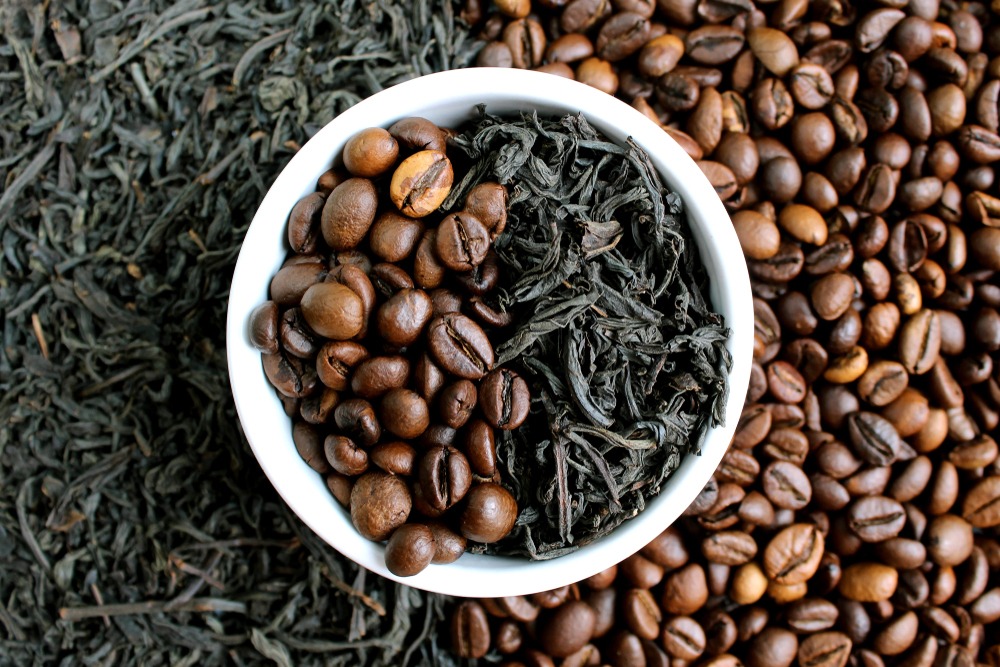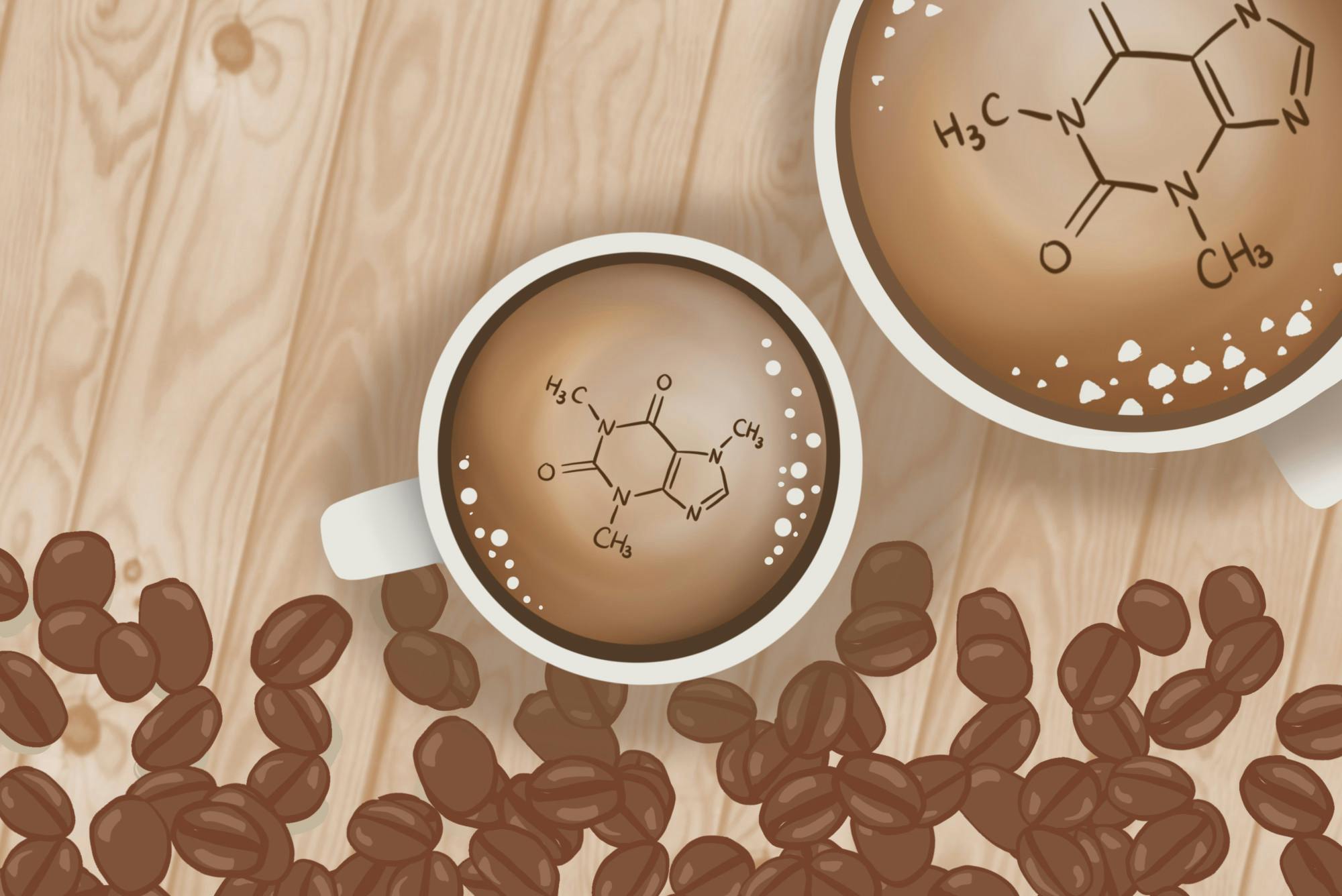Caffeine and You
You actually can consume too much caffeine. Here are the risks.
Most people drink coffee and tea to help stay awake. But scientists warn against overconsumption—and that higher dosage caffeine drinks can lead to stress, lack of sleep, and even death.

A North American bakery-cafe restaurant chain is now facing two different wrongful death lawsuits from family members claiming a loved one died after drinking a beverage containing high quantities of caffeine.
The drink in question is a sugar-sweetened lemonade loaded with the stimulant. Though the exact amount of caffeine consumed in both instances is unconfirmed, both lawsuits allege that the 21-year-old female and the 46-year-old male each died shortly after drinking from a 30-ounce cup of the product that may have contained as much as 390 milligrams of caffeine and 124 grams of sugar, if ice wasn’t used. For comparison, an eight-ounce cup of coffee contains 80 to 100 milligrams of caffeine, and a 12-ounce can of a Red Bull brand energy drink contains 114 milligrams of caffeine.
The amount of caffeine consumed in these cases matter because the stimulant can affect people in different ways, which is one reason nutritional scientists frequently warn against overconsumption.

"At very high doses, caffeine can be toxic or even lethal," says Rob van Dam, a professor of exercise and nutrition sciences at the Milken Institute School of Public Health at George Washington University.
But figuring out the quantity of caffeine in a food or beverage isn’t always easy. Part of the issue is that caffeine isn't considered an additive when it occurs naturally such in coffee, tea, and chocolate.
In such foods, “you won’t find ‘caffeine’ on the label,” says Marilyn Cornelis, an associate professor of preventive medicine at Northwestern University Feinberg School of Medicine. Instead, caffeine is only required to be listed as an ingredient in the United States when it has been added to certain products. Even then, there is no regulation requiring the disclosure of the exact amount of caffeine contained therein, Cornelis explains.
What is caffeine and how does it work?
Derived from the leaves, stem, fruit, or beans of coffee, tea, cacao, and guarana plants, caffeine is the most widely used central-nervous-system stimulant in the world. It’s contained naturally in many plants and foods we eat and is also added in synthetic form to many products such as cola and energy beverages.
Caffeine is a member of a group of chemical compounds collectively known as methylxanthines, which are absorbed rapidly into the bloodstream and affect the central nervous system. They do this, in part, by binding with adenosine receptors throughout the brain and body.
Adenosine is a chemical that plays an important role in promoting sleep and helping the body feel tired. As adenosine rises through wakeful periods, it binds to its receptor, triggering sleepiness.
But because the caffeine molecule resembles adenosine, it can bind to receptors on the nerve cell, thereby preventing adenosine from doing so. Without adenosine signaling sleep, an individual remains awake and alert. This interference both speeds up the cell’s activity and prevents it from slowing down the way adenosine would cause it to do.
What’s more, research shows that caffeine also increases cortisol and epinephrine levels—two hormones associated with feelings of excitement, stress, and anxiousness.
The upside of caffeine
Due to such effects, caffeine can be a useful stimulant to increase mental alertness and reduce fatigue. It's also useful in maintaining performance for the sleep deprived and is used by U.S. Army soldiers for this purpose.
Some research shows that caffeine can also improve memory function and one's ability to concentrate. Long-term consumption has also been linked to a reduced risk of Parkinson’s disease.:max_bytes(150000):strip_icc()/caffeine-pills-GettyImages-822704292-727171ea7e0a49bca41477eb9d9adf54.jpg)
Moderate consumption of coffee and tea may also improve cardiovascular health in some people, says van Dam, though he is quick to point out that any associated benefits are most likely due to other compounds in these beverages such as the antioxidant properties associated with chlorogenic acid and trigonelline, and not necessarily due to the drink’s caffeine content.
"Overall, the health benefits of caffeine intake are relatively minor and not significant enough to encourage caffeine consumption," says Jennifer Temple, director of the nutrition and health research laboratory at the University at Buffalo. What's more, "any potential benefit could be offset by other components of the beverages, such as higher sugar intake."
Indeed, like the 124 grams of added sugars in the aforementioned super-caffeinated lemonade, many caffeinated beverages are frequently loaded with sugar.

That’s because, though manufacturers state that caffeine is added to “enhance the flavor” of their beverages, “caffeine is very bitter and actually makes it so more sugar or other sweetener has to be added to make these drinks palatable," says Temple.
The downsides of caffeine and risks of overconsumption
Beyond avoiding high quantities of sugars in many caffeinated beverages and the health problems that accompany them, it's also important to avoid overconsumption of caffeine itself.
The U.S. Food and Drug Administration recommends that healthy adults limit caffeine consumption to no more than 400 milligrams daily; equivalent to about four small cups of coffee.
"Healthy children and adolescents over the age of 12 can safely consume up to 100 milligrams of caffeine per day," says Temple. However, the effects of caffeine in this younger population are less studied than for adults, so "research targeting this demographic is in progress, fueled by increased concerns surrounding energy drink consumption," says Cornelis.
Experts discourage caffeine consumption in children under age 12.
Though many adults tolerate amounts beyond these daily limits, there are harms associated with ingesting too much caffeine too frequently. These include poor sleep quality, shakiness, vomiting, fast heart rate, low potassium levels, irritability, headache, restlessness, and anxiety.
Studies show that caffeine can also be habit forming and has some long-term adverse effects. These include "an increased risk of hypertension, pre-diabetes, kidney disease and heart disease in some people who consume several cups of coffee per day," says Ahmed El-Sohemy, a professor of nutritional sciences at the University of Toronto.
Caffeine can be especially dangerous at very high levels.
The FDA warns that seizures may occur when one consumes as much as 1,200 milligrams of caffeine too quickly, something that can occur when one drinks too many super-caffeinated beverages, takes caffeine pills, or consumes the powdered form of the stimulant; a single teaspoon of which can contain the same amount of caffeine as 28 cups of coffee. “Pure and highly concentrated caffeine products present a significant public health threat and have contributed to at least two deaths in the United States,” the health agency notes.
Who is most vulnerable?
There's also increased risk for people with certain medical conditions.
People with diabetes, for instance, should exercise caution when consuming caffeine as the stimulant has been shown to alter the way sugar is metabolized—lowering insulin sensitivity and increasing glucose concentration.
People with chronic liver disease may also be more sensitive to its effects “due to impaired ability to metabolize caffeine,” says Adrienne Hughes, an emergency physician and medical toxicologist at Oregon Health and Science University. And the American Heart Association warns people with severe hypertension (blood pressure of 160/100 mm Hg or higher) to avoid drinking even modest amounts of caffeine, as just two or more cups of coffee per day has been associated “with twice the risk of death from cardiovascular disease” in such individuals.
Caffeine is also recommended against for people who feel heartburn frequently, especially in those who experience extreme acid reflux such as individuals diagnosed with GERD.
Expectant moms may also want to limit caffeine consumption because the stimulant has been shown to cause blood vessels in the placenta and uterus to constrict, which could reduce blood supply to the fetus and thereby inhibit growth.
"There is now substantial evidence that caffeine consumption by mothers during pregnancy may slow the growth of the fetus and even increase the risk of miscarriage," says van Dam.
Warning labels and regulations
Because of the risks associated with overconsumption, the nutritional scientists say companies ought to be more transparent about the quantity of caffeine contained in various products.
Regarding the wrongful death lawsuits, for instance, each alleges that, at the time, the “charged lemonade” beverage wasn’t advertised as containing very high amounts of caffeine. Because of cases like these, van Dam says, "more can be done to ensure clear labeling of the amount of caffeine in beverages that are not obvious sources of caffeine."
This isn't as much of an issue with soft drinks, as laws in the U.S. don't allow any cola-type beverage to exceed a limit of 200 parts per million of caffeine (.02 percent), but laws and regulations change for energy drink brands such as Red Bull, Monster, and Rockstar.
"Energy drinks, which are highly caffeinated, are not regulated by the FDA as they are considered supplements and not beverages," says Temple. "This loophole allows energy drink companies to add as much caffeine as they want." Because of this, she believes there should be age limits on the purchase of all energy drinks. "Other countries have done this, but the United States has not."
Source
https://en.wikipedia.org/wiki/Caffeine
https://www.ncbi.nlm.nih.gov/books/NBK519490/#:~:text=Indications-,Caffeine%20is%20a%20naturally%20occurring%20central%20nervous%20system%20(CNS)%20stimulant,of%20tea%20and%20cacao%20beans.
https://www.betterhealth.vic.gov.au/health/healthyliving/caffeine
https://medlineplus.gov/caffeine.html
https://www.mayoclinic.org/healthy-lifestyle/nutrition-and-healthy-eating/in-depth/caffeine/art-20045678





































































